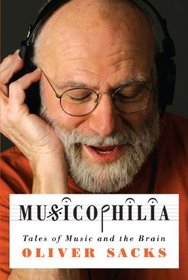Helpful Score: 2
I find brain research to be a fascinating subject and this was a wonderful study of the effects of music on the brain. This goes into research of measuring patterns and brainwaves, technology that wasn't available a few decades ago. Some of the cases are beneficial to the individuals, such as a man who was struck by lightning and found he became obsessed with creating music. Some are detrimental to the individuals, such as finding music causes them to go into seizures. Everything from a tune that gets stuck in your head to autism and the effects of music therapy are covered. It will give you an appreciation for your own experience of music. I highly recommend!
Helpful Score: 2
It took me a long time to finish this, because there are times I can only take science in small doses. But it is a wonderful collection of anecdotes on the effect of music on the brain, and particularly in neurologically impaired patients. Oliver Sacks has a way with words that makes the science easy to understand. What I found particularly fascinating was the revelation that different parts of the brain are responsible for the different aspects of music, which explains how some people can have perfect pitch and musical talent, but be unable to appreciate the emotional effect of music, and vice-versa. Also extremely interesting are the examples of music therapy on patients with dementia, Alzheimers, Parkinson's, and a host of other neurological conditions. Throughout the book, his love for music is clear, and he shows us just how powerful it can be.
Helpful Score: 1
This is a collection of stories and data collected by Sacks. The data is presented in a scientific manner, and then the author explains what exactly the data means for those of us who aren't so familiar with the medical field. I find that this "revised and expanded" edition would probably be more interesting, as the author actually added portions of stories and letters he received from those who wanted to share their experiences with various things involving music. Such as synaesthesia, developing deafness, and "earworms".
Fascinating case studies of people displaying exceptional musical ability--some quite suddenly after injury or disease. The book's lively writing style keeps it from becoming a science text. The development of perfect pitch in children correlated with tonal languages was especially interesting. I loaned the book to my dd's Suzuki violin teacher, who is pleased that Sacks' information confirms that early music exposure increases brain function.
Well, let me start off by saying that I LOVE music. I love what effects it has on the brain, so I grabbed this book at B&N one day, but have to admit, was kind of dissapointed. Some of the stories, well, just seemed far fetched. It was very interesting, I just don't know what to think of it. You'll have to find out for yourself I guess, because obviously others found it wonderful. I do have to warn you though, this was NOT written from a Christian perspective, and there are a few cuss words in it. I wanted to be able to pass this on to a friend who is into music as well, but didn't, due to the language. I can't remember if there was other content in it or not...
A well written, mostly jargon-free book covering neurological disorders involving music. Although I didn't find any striking revelations, I found many of the author's case histories fascinating. He ties in many cases he's written about in past books too.
While this book is filled with Oliver Sacks' trademark anecdotes and is at times engaging and even poignant, I found it a bit too long and repetitive and I was glad it was over by the time I finished it. It would have been served by leaving about 15% of it on the editor's floor. An interesting wrinkle in the burgeoning neuroscience genre.




